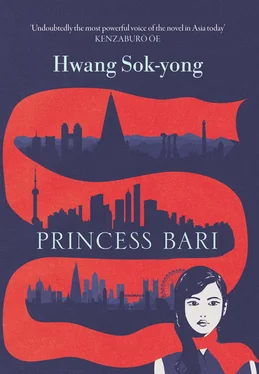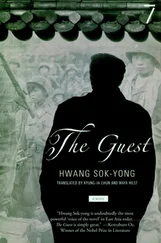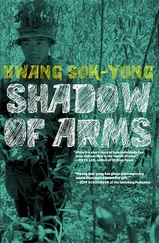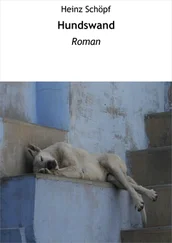Our uncle lived with us for several months until he found a job, and I got to know him a little better. He was good at the accordion. He was well known back in secondary school for his performances in the school band, and even in the army, instead of having to do labour, he was sent from base to base to perform propaganda songs for the soldiers. Every time he leaned up against the wall of the house and played his accordion, one leg splayed and stamping out a rhythm against the ground, all the neighbourhood kids came swarming. His eyes would flutter as he lost himself in the music, shoulders rising and falling as he filled the bellows with air and pushed it out again. Our father would take one look at that and grumble to Mother:
“He’s got no sense. Who’d want to employ a joker like him?”
“Someone will. Everyone says he’s bright and has a good personality.”
With Father’s help and the recommendations of several members of our neighbourhood unit, our uncle got a job at a trading company.
During my second year in school, things started to go downhill. It wasn’t just our family but the entire city of Chongjin. The grown-ups whispered among themselves that even Pyongyang was worse off than it had ever been. The cookies and candies that had been distributed to children on every holiday and at every memorial were, of course, cut off, and our rations of white rice were mixed with chopped-up corn until the rice gradually ran out; there were more and more months when we received only corn.
Oh! I have to tell you what happened to Hindungi, her puppies and little Chilsung. I told you that Hindungi had seven babies. Well, despite our attempts to stop her, our mother couldn’t stand the sight of those squirming pups, so she put them in a basket to take to market. I happened to be coming home from school just as she was leaving, and I clung to the basket with both hands and shook my head and cried.
“No, you can’t!”
“Child, how are we supposed to raise seven dogs? I’ve got my hands full already trying to keep you girls fed.”
“Grandma, stop her!”
Grandmother came running out and tried to calm us down: “How about if we keep just one dog and sell the others?”
I chose Chilsung because he and I had been friends from the start. Mother tried to snatch him back, but Grandmother put her arm around my shoulders and turned me away from her. The whole time our mother was collecting the puppies, Hindungi lay slumped in her doghouse and didn’t budge. They were ready to be weaned, after all, and besides, Hindungi knew it was coming.
One day, around the time that Chilsung’s legs had just grown long and his ears were standing up, Mama Hindungi disappeared. Of course, by that I mean that Mother and Grandmother gave her to someone, not that she left on her own. Hindungi was moving sluggishly with age and had some kind of skin disorder: the hair on her rump had fallen out and the pink skin underneath was showing. Bathing the dog in water used to boil adzuki beans was supposed to help, but by then we were well into the days when rice cakes piled high with the sweet mashed beans were a thing of the past, so how were we supposed to find so much as a single adzuki bean? I no longer resent my uncle, but back then, after hearing that he was the one who’d dragged Hindungi away, I stopped offering him any nice words in response to anything he tried to say to me. (That wasn’t the only reason. It didn’t happen until much later, but he was also the reason our family got split up.) Grandmother told me what happened when Hindungi left.
“Your uncle said he would give her to some men he works with. She must be at least fifteen years old now — that’s a long life for a dog. How can we bear to watch her suffer? So I told him to take her. When your uncle put the rope leash on her, she fought it and dug in her heels. I stroked her head to calm her down and told her: ‘You’re sick. He’s taking you somewhere to make you all better, so go on.’ That’s when she gave in and tottered after him. But she kept looking back at me after every few steps.”
When we heard that Hindungi had followed our uncle because Grandmother told her he was taking her to get healed, but still had to be dragged away because she suspected it wasn’t true, my sisters and I turned our backs on our grandmother and burst into tears. There was no mystery about what middle-aged men planned to do with an old dog. They would gather on a riverbank somewhere, pass around bottles of cheap soju , light a bonfire, fill a big iron pot with water and get it boiling as they laughed and cackled …
Fortunately, we still had Chilsung. Grandmother had named him after the seven stars in the Big Dipper, because he was the seventh pup, just like me. He took his mother’s place in the old doghouse, and from then on luck began to smile on us. Of course, it wasn’t all good news: our uncle got out of the army and came back. Jin got married and moved to Wonsan, and Sun enlisted in the army, which was good — but the best thing by far that happened to us was that our father got promoted and we moved into a new house. Mother and Grandmother were so delighted that they never once got annoyed while packing our things. They went along with whatever Father wanted and didn’t raise their voices at us either.
Chongjin had always been known as the best city to live in. The high mountains that surrounded the city like a folding screen blocked the cold north winds and kept us in firewood, wild greens, and all kinds of fruit; delicious rice grew in fields fed by the Suseong Stream, which never dried up even during the worst droughts; and the waters were rich with seafood, which was why, whenever I told people from other parts of the country that I was from Chongjin, they said: “Ah, you grew up in Paradise.”
But best of all, it wasn’t too far from the border, which meant there was a frequent exchange of goods, and even ordinary citizens could easily get their hands on things from the outside world. Sons and daughters who’d moved to other parts of the country after getting married used to send word to their families in Chongjin asking them to buy various things for them from over the border. But once rumours started going around that the Soviet Union had collapsed some years earlier, the grown-ups began whispering about the poor shape the Republic was in. Chongjin had it better than other cities, though not as good as Pyongyang, of course; even so, there were times when rations were cut off for two months and then three months, and shabbily dressed people who’d left the countryside in search of food began showing up in the market streets.
Father became a vice chairman in Musan. The city of Musan produced a lot of iron ore and coal and various minerals, and our mother boasted proudly over and over that there was no one better suited than our father at trading the seafood that came out of Chongjin and the minerals that came out of Musan with China in exchange for food. That was probably because Father had worked in the trade sector since he was young and, as Grandmother liked to brag, Chinese and Russian flowed from his mouth like water.
The Party chartered a truck to haul our belongings to Chongjin Station, but in fact our luggage was minimal given the size of our family. All we had packed was bedding, a big bundle of clothes, pots and pans and the like. As the company housing came furnished with cupboards and wardrobes, we gave those items to our neighbours and asked our uncle to sell the electrical appliances, such as our fan, refrigerator and black-and-white television. According to our uncle, Father would be posted right on the border, so we would be able to buy the latest models very cheaply. The truck was necessary simply because there were so many of us.
A bit of trouble arose when we put Chilsung in the back. The young Party worker sitting with Father in the cab of the truck objected: “What’re you packing the dog for? You should give it to your neighbours. It’ll go good with some alcohol.”
Читать дальше












